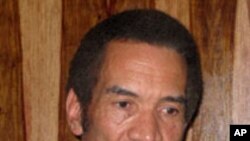Voters in Botswana will go to the polls Friday in a regular general election expected to return the ruling Botswana Democratic Party (BDP) to power for another five years.
<!-- IMAGE -->President Ian Khama, the popular son of Botswana's founding president, will face his first electoral test in Friday's poll. Mr. Khama came to power last year on the retirement of President Festus Mogae and, in accordance with the country's electoral law, was elected by parliament.
Mr. Khama's BDP has ruled Botswana since independence in 1966, a period that has seen stability and, until last year, sustained economic growth in which the per-capita income has risen to $13,900.
Botswana derives the lion's share of its income from diamond sales, which plummeted when the country was forced to shut several mines as a consequence of the global economic crisis. The finance minister reported the economy shrunk in the year to June 2009 by 15.5 percent.
Mr. Khama came to politics from a military background and his style of leadership is complex. Unusual for a country's president, he can at times be found walking around the capital, to personally assess how people are faring.
On the other hand, his insistence on discipline and a strong work ethic for government officials has made even some in his own party uneasy.
Political ethics lecturer Joseph Gaie, of Botswana University in Gaborone, tells VOA this may account, in part, for recent disputes between Mr. Khama and a few senior members of the BDP. "That could in some way explain the conflict within the party because some people have always thought the BDP is there to rule forever and they were very comfortable even to the point of arrogance," he said.
Because the BDP has been in power for so long, party opponents and others critics often question Botswana's democratic credentials, arguing the country may just as well be a one-party state. BUt there are several opposition parties, which in the 2004 election, were supported by 49 percent of voters.
Gaie says the reason opposition parties have not done well is because they too are often beset by leadership squabbles. But he says the larger opposition parties, the Botswana Congress Party and the Botswana National Front are becoming much better organized. The two parties have indicated they are likely to cooperate after the election.
Botswana has a population of nearly two million people and in the 2004 election there was a voter turnout of 72 percent.










